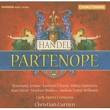
Partenope is a three act musical opera performed by Handel. It was one of the first operas I had ever witnessed before. On 7th November 2008 I saw the opera and it was an extremely powerful and enjoyable event. Handel’s opera emphases the problems in love relationships and how love can be cruel and harsh. The main characters are Emilio, Partenope, Arsaca, Armindo, Rosmira disguised as Eurimene and Ormente. I saw the opera live at the Coliseum theatre in London. Within all of these characters, love relationships get mightily confused because of the mix up of love in which they get themselves caught up in. Arsace, Eurimene and Armindo all begin within loving Partenope. Partenope is seen as the main character who speaks her mind, regardless of whether or not she hurts anybody. Partenope starts off loving Arsace but ends up rejecting him because she hopes to go with Armindo. Arsace wanted to run of with Rosmira.
In the end the characters end up in love and end up happy. What this performance shows more than anything is the unpredictable nature of love and emotions. Our instincts and our feelings can change depending on the situation. Partenope shows the conflict with love and friendship and the cruel nature of love. More than anything the performance showed deep passion and deep expression. The characters actively and verbally express to let themselves go wild. The opera shows how unfocused and wayward love can be. At the same time it can also be an overwhelming desire that is to powerful to neglect. I think also the opera showed the conflict that love can cause and that it’s not free and as beautiful as we might think. There can be two people loving the same person for example. This can lead to violence and hatred in the process. It’s our desires which make us behave in a certain way and feel in a certain way. The threat and violence is shown in Partenope when Emilio offers Partenope marriage which she refuses. Emilio threatens her in the process. Partenopes story does stereotype in some way. Those men such as Emilio are being violent to her and abusing her which shows the patriarchal dominance in some way. To some extent the opera treats men like active wolves and women as innocent and passive. All the characters show their affections for each other, but in the process are entangled. I suppose however during the 1730 when Handel wrote the opera, a completely male dominant society would have been perfectly normal. In the end the characters end up happy and the problems resolve themselves.
Handel’s music is brilliantly performed and blends with the words superbly. He mixes subtle pieces with louder and some with more disturbing pieces. His music is challenging and gripping and makes you feel for his characters on stage. The music drives you to feel for a character when he or she is fulfilling there passions expressively.
Overall the performance was excellent and Partenope is a great example of what opera is about and what kind of questions it raises. Not in terms of logical and rational but in terms of the human nature and the human form.
I obtained the synopsis information from a useful programme I bought from the London Coliseum theatre.
In the end the characters end up in love and end up happy. What this performance shows more than anything is the unpredictable nature of love and emotions. Our instincts and our feelings can change depending on the situation. Partenope shows the conflict with love and friendship and the cruel nature of love. More than anything the performance showed deep passion and deep expression. The characters actively and verbally express to let themselves go wild. The opera shows how unfocused and wayward love can be. At the same time it can also be an overwhelming desire that is to powerful to neglect. I think also the opera showed the conflict that love can cause and that it’s not free and as beautiful as we might think. There can be two people loving the same person for example. This can lead to violence and hatred in the process. It’s our desires which make us behave in a certain way and feel in a certain way. The threat and violence is shown in Partenope when Emilio offers Partenope marriage which she refuses. Emilio threatens her in the process. Partenopes story does stereotype in some way. Those men such as Emilio are being violent to her and abusing her which shows the patriarchal dominance in some way. To some extent the opera treats men like active wolves and women as innocent and passive. All the characters show their affections for each other, but in the process are entangled. I suppose however during the 1730 when Handel wrote the opera, a completely male dominant society would have been perfectly normal. In the end the characters end up happy and the problems resolve themselves.
Handel’s music is brilliantly performed and blends with the words superbly. He mixes subtle pieces with louder and some with more disturbing pieces. His music is challenging and gripping and makes you feel for his characters on stage. The music drives you to feel for a character when he or she is fulfilling there passions expressively.
Overall the performance was excellent and Partenope is a great example of what opera is about and what kind of questions it raises. Not in terms of logical and rational but in terms of the human nature and the human form.
I obtained the synopsis information from a useful programme I bought from the London Coliseum theatre.
Gregory's myspace profile and his blog is at:
http://profile.myspace.com/index.cfm?fuseaction=user.viewprofile&friendid=92945414
